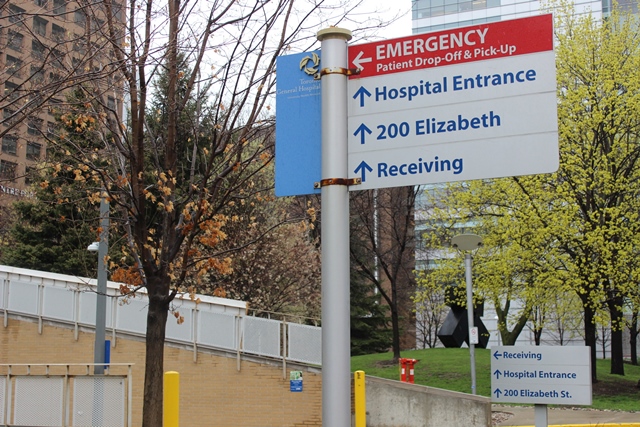By Erica Di Maio
Imagine it’s your vacation and you arrive at your sunny destination only to be told your room isn’t ready.
You sit in the lobby, watching the clock, feeling discouraged as minutes turn into hours, then days, and the waiting area becomes increasingly over-crowded, noisy, chaotic, and you can’t find an employee who can tell you when the waiting will end.
Now, imagine if rather than a tropical resort it was a hospital emergency department (ED), and the waiting was in a hallway and lasted several days.
This is the reality for many Ontarians – and for hospitals across the country who experience critical overcrowding and heavy emergency resource demand.
Managing a 24/7 complex operation
The ability to manage fast-paced, complex operations is critical to the success of patient safety and patient care delivery at a large, academic, multi-site healthcare institution. A number of unexpected events including a flu outbreak, people experiencing complications after surgery, a surge in ED visits or performing a large number of transplants in a few days can impact the organization’s operations and the most effective processes need to be in place to accommodate these shifting needs.
To address this, the University Health Network’s (UHN) Lean Process Improvement team led a rigorous two-day workshop earlier this year including more than 80 UHN leaders and team members across four hospital sites and many disciplines – including nurses, physicians, professional practice, supports services and more – to begin the development of an Overcapacity Protocol action plan.
Executive Vice President (EVP) and Chief Operating Officer, Mike Nader, and Dr. Charlie Chan, EVP and Chief Medical Officer at UHN are spearheading efforts to optimize clinical operations and recognize that while changing practices and organizational culture is difficult, it’s also necessary for sustainability.
“This work directly supports our focus on caring safely and team engagement,” Mike says. “Healthcare is generally a reactive culture. When we shift from a reactive to proactive culture, we release more time for our staff to focus on the needs of the patient.”
“We need to have more efficient processes in place to ensure the right patient is in the right location, being cared for by the most appropriate experts. We should admit patients who need our specialized acute care service. However, those who do not should be treated and supported in their transition back home and into the community.”
At the two-day workshop, healthcare teams extensively examined and debated their current practices – first by site, and then as a UHN collective – to identify and land on triggers that cause the hospitals to go into overcapacity mode.
For example, two of four UHN hospitals have emergency departments with a continuous flow of patients being admitted. Therefore, the total number of admitted patients, individuals waiting for ED consults and planned versus unplanned surgeries can all lead to unpredictable surges in patient volumes.
Once triggers were identified, escalation levels were established to indicate actions and resources required by interdisciplinary teams to meet the demands of the hospital – level one being low risk, standard operating levels, and four meaning the hospital is at critical risk of not being able to safely support patient volumes.
The OCP also supports staff in de-escalating appropriately when the hospital has come out of overcapacity and needs to close beds and get back to regular state.
‘We can and need to change how we do things’
UHN’s Overcapacity Protocol soft launched in April using OCP levels and triggers to communicate patient volumes and launch into specific actions as hospitals shift from low, medium, high and critical risk. As the work is being trialed across units, UHN will use best practices and key learnings to formally launch OCP in the coming months.
“We need to do better by our patients,” says Brenda Kenefick, Director, Lean Process Improvement at UHN. The ‘overcapacity’ practice has become normalized for many hospitals and we need to reset the standard.”
“Our hospitals are bursting at the seams. Our teams are doing their best to keep up the pace to care for our patients, but we need better processes in place to support them.
“We can and need to change how we do things.”
Erica Di Maio communications advisor at University Health Network.




